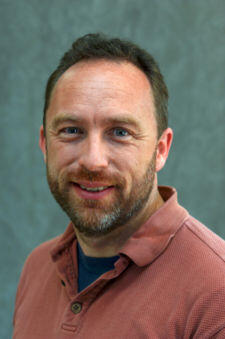April 13, 2007
Wikipedia co-founder shares Web visions with VCU audience
Share this story

Over the course of the past school year, Virginia Commonwealth University has hosted some of the country’s leading experts on culture and the Internet as part of its yearlong series, “Creating and Consuming Culture in the Digital Age.”
Speakers in the series engaged a diverse range of topics, but Richard Fine, an English professor at VCU and one of the series’ organizers, said that a subject that kept emerging for discussion was Wikipedia, the massive, collaboratively authored online encyclopedia that courts both controversy and a huge audience.
So it was only fitting, Fine said, that Jimmy “Jimbo” Wales, Wikipedia’s colorful co-founder and most visible cheerleader, served as the “Creating and Consuming Culture” series’ final speaker, talking to a near-capacity crowd on April 11 at the Commonwealth Ballroom about the successes and challenges of Wikipedia and about his future plans for other “wiki-related” projects.
Wikipedia, Fine noted at the outset of the program, is “so enormously influential, but it has not been without a great deal of controversy.” VCU, in fact, hosted a panel of experts earlier in the week to debate questions about Wikipedia’s authority and reliability as part of the “Creating and Consuming Culture” series.
Wales did not shy away from discussing Wikipedia’s perceived shortcomings during his hour-long appearance, acknowledging some criticisms and refuting others, but he also spoke with enthusiasm about the impact of Wikipedia, which he said is the ninth most popular Web site on the Internet. He called Wikipedia, which is a nonprofit organization with a small staff and budget, “a grassroots phenomenon” – one that had spread swiftly around the world, crossing barriers of language and culture.
Wales said he viewed his work with Wikipedia and other, younger wiki projects as being less about technology and more about society.
“It’s about creating a culture of sharing and creativity that is not based on market exchange but on intellectual exchange,” Wales said.
Wales said his ultimate goal for Wikipedia was that it reach every single person on the planet – to provide everybody with a free encyclopedia – though he later clarified that his more practical, though still lofty, aspiration was to provide at least 250,000 Wikipedia articles in every language spoken by at least 1 million people. He said he expected that achievement – there are currently 347 languages that qualify – might take another 15 to 20 years.
On the question of accuracy in Wikipedia entries – one of the areas in which Wikipedia has received the most criticism – Wales highlighted an academic study that demonstrated that Wikipedia’s error rate was higher than the traditional Brittanica Encyclopedia – but not by much. Wales said there are mistakes on Wikipedia, but he says the organization’s seven full-time employees and thousands of volunteer “editors” work hard to catch and correct them quickly.
Many view the digital world as a sharply divided one rife with political tensions and frequent vitriol, Wales said. However, he argued that Wikipedia’s entries displayed a reliable neutrality and moderation because of the resource’s collaborative authorship. One-sided, subjective entries would not make it past the Wikipedia’s army of volunteers, he said.
Wales said he would not expect college students to cite Wikipedia for school papers. Still, he said his college professors would also have scoffed at an Encyclopedia Brittanica citation when he was a student. Wikipedia’s purpose is to serve as a first stop for information -- an easy, accessible reference, but not necessarily the premier authority on any single topic.
“It’s a matter of using Wikipedia appropriately,” Wales said.
Wales no longer spends much time on the operations of Wikipedia, he said, though he still tours the globe promoting the site. Among the new projects that most interest him now are Wikia.com and Wikia Search. The former allows users to create communities around particular topics, such as a TV show or a city; the latter is a wiki-based search engine project that will produce a more transparent, human-driven search process than already exists online, according to Wales.
Wales spoke candidly about not knowing whether a project such as Wikia.com would make any money – unlike Wikipedia, it is a for-profit enterprise – but he said he figured a business model would eventually emerge.
“I always do whatever’s the most fun thing I can think of and this seems like the most fun right now,” Wales said.
The “Creating and Consuming Culture in the Digital Age” series is sponsored by the Department of English in collaboration with the School of the Mass Communications and the School of the Arts. It is funded by the VCU Honors Program through its National Endowment for the Humanities Year program.
Subscribe to VCU News
Subscribe to VCU News at newsletter.vcu.edu and receive a selection of stories, videos, photos, news clips and event listings in your inbox.









